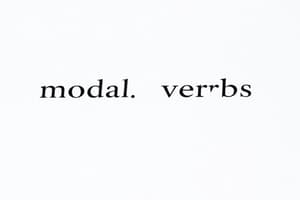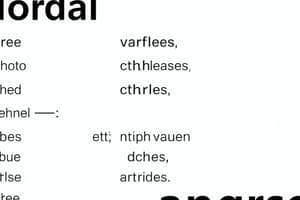Podcast
Questions and Answers
Which modal verb best expresses a strong certainty about a future event?
Which modal verb best expresses a strong certainty about a future event?
- Should
- Might
- May
- Will (correct)
Which modal verb is most appropriate for expressing a weak obligation?
Which modal verb is most appropriate for expressing a weak obligation?
- Should (correct)
- Need to
- Must
- Have to
Which modal verb indicates a lack of necessity or obligation?
Which modal verb indicates a lack of necessity or obligation?
- Must
- Should
- Have to
- Needn't (correct)
Which modal verb is suitable for making a polite request?
Which modal verb is suitable for making a polite request?
Which of the following modal verbs expresses prohibition?
Which of the following modal verbs expresses prohibition?
Which modal verb is appropriate for extending an offer?
Which modal verb is appropriate for extending an offer?
Which modal verb is used to express a promise?
Which modal verb is used to express a promise?
Which modal verb is used to give advice?
Which modal verb is used to give advice?
Which modal verb expresses ability?
Which modal verb expresses ability?
What is the function of modal verbs?
What is the function of modal verbs?
Which of the following sentences correctly uses a modal verb to express possibility?
Which of the following sentences correctly uses a modal verb to express possibility?
Which sentence uses a modal verb to express strong obligation?
Which sentence uses a modal verb to express strong obligation?
Which sentence uses a modal verb to ask for permission?
Which sentence uses a modal verb to ask for permission?
Which sentence uses a modal verb to express advice?
Which sentence uses a modal verb to express advice?
Which of the following modal verbs indicates the strongest level of certainty?
Which of the following modal verbs indicates the strongest level of certainty?
Which sentence correctly uses a modal verb to express ability in the past?
Which sentence correctly uses a modal verb to express ability in the past?
In which scenario is the modal verb 'should' most appropriately used?
In which scenario is the modal verb 'should' most appropriately used?
Which modal verb best fits the sentence: 'You ____ not enter without permission' to indicate it's forbidden?
Which modal verb best fits the sentence: 'You ____ not enter without permission' to indicate it's forbidden?
Select the modal verb that indicates the highest probability or certainty.
Select the modal verb that indicates the highest probability or certainty.
What does the modal verb 'needn't' imply in a sentence?
What does the modal verb 'needn't' imply in a sentence?
Flashcards
Modal Verbs
Modal Verbs
Auxiliary verbs that modify the meaning of the main verb. Used for advice, requests, predictions, and prohibitions.
Modals for Certainty
Modals for Certainty
Indicates a high degree of certainty or confidence in a future event.
Ought to / Should
Ought to / Should
Expresses a strong feeling of duty or correctness.
Modals for Possibility
Modals for Possibility
Signup and view all the flashcards
Modals for Strong Obligation
Modals for Strong Obligation
Signup and view all the flashcards
Modals for Weak Obligation
Modals for Weak Obligation
Signup and view all the flashcards
Modals for No Obligation
Modals for No Obligation
Signup and view all the flashcards
Modals for Permission
Modals for Permission
Signup and view all the flashcards
Modals for No Permission
Modals for No Permission
Signup and view all the flashcards
Modals for Offer
Modals for Offer
Signup and view all the flashcards
Modals for Request
Modals for Request
Signup and view all the flashcards
Modals for Promise/Decision
Modals for Promise/Decision
Signup and view all the flashcards
Modals for Advice
Modals for Advice
Signup and view all the flashcards
Modals for Ability
Modals for Ability
Signup and view all the flashcards
Study Notes
- Modal verbs are auxiliary verbs that modify the meaning of main verbs.
- They express advice, suggestions, requests, predictions, and prohibitions.
Degrees of Certainty
- Really Certain: Expressed using "will," "shall," "must," "won’t," "shan’t," and "can’t".
- Example: "Jahna’s debut party will be planned secretly."
- Very Likely: Expressed using "should" and "ought to."
- Example: "We should be there before the time."
- Possibility: Expressed using "may," "might," and "could."
- Example: "It may rain today."
Obligation
- Strong Obligation: Expressed using "must," "have to," and "need to."
- Example: "The plan must be accomplished without her knowing it."
- Weak Obligation: Expressed using "should" and "ought to."
- Example: "I should see the dentist."
- No Obligation: Expressed using "needn’t," "don’t need to," and "don’t have to."
- Example: "I need not brush my teeth now."
Permissions
- Permission: Expressed using "can," "may," "could," and "might."
- Example: "May I borrow your pen?"
- No Permission: Expressed using "can’t," "may not," and "must not."
- Example: "You cannot go out without a quarantine pass."
Offers and Requests
- Offer: Expressed using "will" and "shall."
- Example: "I will bring your things here."
- Request: Expressed using "will," "would," and "could."
- Example: "Will you open the windows?"
Promises, Decisions, Advice and Ability
- Promise and Decision: Expressed using "will."
- Examples: "I will come back after sunset." / "I will eat now."
- Advice and Suggestion: Expressed using "shall," "should," and "shouldn’t."
- Example: "You should wear appropriate attire for your job interview."
- Ability: Expressed using "can" and "could."
- Example: "The students can sing harmoniously."
Studying That Suits You
Use AI to generate personalized quizzes and flashcards to suit your learning preferences.




